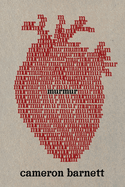
Murmur, the second poetry collection by Cameron Barnett (The Drowning Boy's Guide to Water), is an unflinching depiction of the experiences of Black people--especially young men--in the U.S.
Recurring "Murmur" stanzas refer to Barnett's health, particularly a heart murmur diagnosed in childhood, but also--figuratively--to whatever is quiet and hidden: secrets, rumors, ghosts. Cardiac terminology, along with the astronomical language of stars and black holes, is used to good metaphorical effect throughout. "I'm searching my messy truths for an arrhythmia/ of remembrance," he writes. In the final poem, "Systole, Diastole," pumping blood creates a bittersweet refrain that contrasts detachment and determination: "holding on, letting go, holding on,/ letting go, holding on."
Family oral history infuses the verses, revealing how "we are pieces/ of the people who came before us." Barnett's grandmothers were Pittsburgh seamstresses; his grandfather was an NAACP leader and churchman wielding the gavel of justice. "My great-great-great-grandmother/ stares at me in sepia," Barnett muses, relying on photographs as well as interviews. He taps into a wider African American ancestry marred by enslavement and lynching. Racialized tragedies persist, as "Why Are All the Flags at Half Mast?" and "My heart is" lament, in the form of mass shootings and the police killings of Black men.
A repeated "say it with me" invitation echoes call-and-response forms, as does the provocative "Reading Black Poems to White Audiences: A How-To Guide--Part III: The N-Word," which interjects the epithet frequently. Playful, truthful, in-your-face: that describes the whole of this alliterative, heartfelt collection of 45 poems. --Rebecca Foster, freelance reviewer, proofreader and blogger at Bookish Beck

